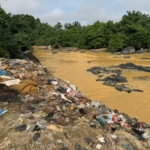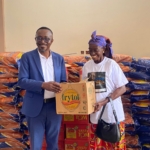
Speakers at the Deloitte webinar titled “Strategic Intersection of Climate, Agriculture and Healthcare in Ghana” are calling for proactive policies that will minimise the impact of climate change on the agricultural ecosystem and healthcare delivery.
Simon Van Wyk, Deloitte Africa Sustainability Leader, Strategy and Transactions, who began the conversation, said climate change must be prioritized, with contingency measures for the agriculture and healthcare sectors implemented.
According to him, the rest of the world is committing so much to climate change compared to Africa, highlighting the investments of the global agric-systems in the next five years, estimated at US$1.0 trillion.
It’s been extremely disruptive [climate change]; you know, there are a couple of schools of thought that climate change isn’t real, climate change isn’t happening to the degree that people predicted. However, the Paris Agreement in 2015 stated that we need to lower the global temperature of the Earth so that we can preserve the ecosystem in which we operate. Because of the intensity and frequency of weather events, they [climate change] are getting excruciating. The reality is that Ghana and many others across the world would struggle to bounce back”, Mr. Van Wyk mentioned.
The Programme Manager, Occupational and Environmental Health, Ghana Health Service, Dr. Carl Osei, also said extreme weather events such as floods, drought, intense heat and strong winds destroy crop production and affect livestock, therefore affecting food security.
“When there’s inadequate intake in terms of quality, we get malnutrition and other health issues like anemia, poor reproductive health outcomes like low birth rates and pre-term births and miscarriages. Those in the rural communities whose livelihood depends on farming, women and children are more likely to be affected by some of these outcomes”, he stressed.
Wesely Solomon, Partner and Life Sciences & Healthcare Leader, Deloitte West Africa called for the leveraging of digital technology such as drones, smart crops and digital interfaces to develop both the agriculture and healthcare sectors.
Franscis Kwasi Korankye, Deputy Director of Agriculture in charge of e-Agriculture and Head of IT at the Ministry of Food and Agriculture, for his part, said, his ministry is leveraging information technology to execute several interventions within the agricultural ecosystem. For instance, farmers are using drones to spray their crops to prevent pest and disease infections and also undertaking other activities such as measurement.
He was, however, worried about the ratio between agricultural extension officers and farmers.
Host of the webinar, Roland Baah Teye, Deloitte Partner, Technology and Transformation, said Deloitte will be at the forefront of leading the conversation on climate change and its effects on health and the agricultural ecosystem.
He pointed out that Ghana’s agricultural sector is not only the backbone of the economy, but also a critical determinant of food security and livelihood, highlighting the increasing vulnerability to the impact of climate change, ranging from unpredictable rainfall patterns to rising temperatures and new pests and disease challenges.
He urged all to pay attention to environmental shifts that not only threaten crop yields and farmers’ income but also healthcare delivery.
The webinar is one of many to be held in the coming months.




